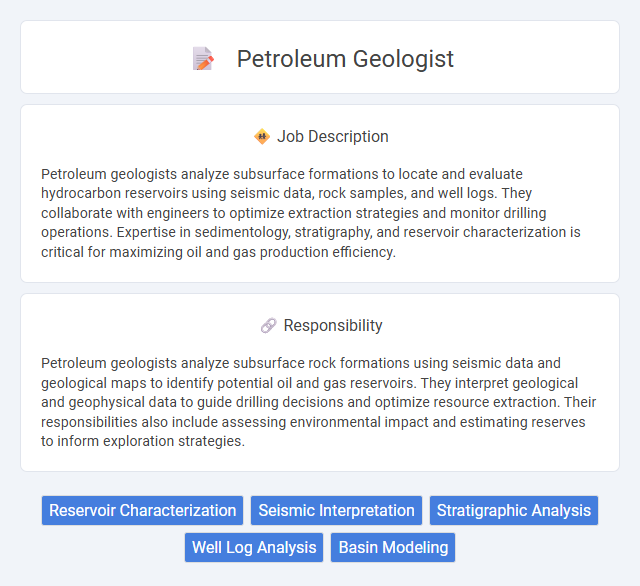
Petroleum geologists analyze subsurface formations to locate and evaluate hydrocarbon reservoirs using seismic data, rock samples, and well logs. They collaborate with engineers to optimize extraction strategies and monitor drilling operations. Expertise in sedimentology, stratigraphy, and reservoir characterization is critical for maximizing oil and gas production efficiency.
Petroleum geologists often work in challenging environments, including remote locations and fluctuating weather conditions, which may affect individuals sensitive to physical strain or isolation. Those with strong analytical skills and a passion for geology might find the job rewarding, while people who prefer predictable office settings might struggle. The role likely suits individuals who enjoy problem-solving and can manage long hours in the field under varying conditions.
Qualification
A petroleum geologist typically requires a bachelor's degree in geology, earth sciences, or a related field, with advanced roles often demanding a master's or PhD. Essential qualifications include proficiency in geological mapping, seismic interpretation, and reservoir characterization techniques. Strong analytical skills and experience with software like GIS and Petrel are critical for exploring and evaluating hydrocarbon deposits effectively.
Responsibility
Petroleum geologists analyze subsurface rock formations using seismic data and geological maps to identify potential oil and gas reservoirs. They interpret geological and geophysical data to guide drilling decisions and optimize resource extraction. Their responsibilities also include assessing environmental impact and estimating reserves to inform exploration strategies.
Benefit
Petroleum geologists benefit from strong demand in the energy sector, which may offer competitive salaries and job stability. Their expertise in analyzing subsurface formations potentially leads to high-impact discoveries, increasing their professional value. Career growth and opportunities for international work could also enhance their long-term benefits.
Challenge
Petroleum geologists likely face the challenge of accurately interpreting complex subsurface data to identify viable oil and gas reservoirs. The probability of encountering unpredictable geological formations may require advanced analytical skills and adaptability. This role often demands balancing environmental concerns with economic feasibility, adding further complexity to decision-making processes.
Career Advancement
Petroleum geologists advance their careers by gaining expertise in seismic interpretation, reservoir characterization, and basin analysis, often progressing to senior geoscientist or project manager roles. Specializing in advanced software tools and obtaining certifications such as Certified Petroleum Geologist (CPG) enhances their qualifications for leadership positions. Continuous learning about emerging technologies in hydrocarbon exploration and developing strong project management skills are critical for career growth in the petroleum industry.
Key Terms
Reservoir Characterization
Petroleum geologists specializing in reservoir characterization analyze subsurface rock formations to evaluate the distribution, quality, and extent of hydrocarbons within reservoirs. They utilize seismic data, well logs, core samples, and petrophysical measurements to create detailed 3D models that predict reservoir behavior and optimize extraction strategies. Expertise in sedimentology, stratigraphy, and geostatistics is essential for improving reservoir management and enhancing hydrocarbon recovery.
Seismic Interpretation
Petroleum geologists specializing in seismic interpretation analyze subsurface geological formations using seismic data to identify hydrocarbon reservoirs. They integrate seismic reflection profiles with well logs and geological models to delineate trap structures and stratigraphic features critical for oil and gas exploration. Advanced knowledge of geophysical software and seismic attributes is essential to accurately map reservoirs, assess resource potential, and guide drilling decisions.
Stratigraphic Analysis
Petroleum geologists specializing in stratigraphic analysis examine sedimentary rock layers to identify reservoirs and predict hydrocarbon presence. They utilize seismic data, well logs, and core samples to interpret depositional environments and stratigraphic traps crucial for oil and gas exploration. Expertise in stratigraphy enhances reservoir characterization, reducing drilling risks and optimizing resource extraction.
Well Log Analysis
Petroleum geologists specializing in well log analysis interpret subsurface geological formations using data from resistivity, gamma ray, density, and neutron logs to identify hydrocarbon reservoirs. This expertise enables accurate correlation of lithology, porosity, and fluid content essential for optimizing drilling and production strategies. Proficiency in advanced software tools such as Petrel and Landmark ensures precise stratigraphic and structural modeling for enhanced reservoir characterization.
Basin Modeling
Petroleum geologists specializing in basin modeling analyze sedimentary basins to predict the location and quantity of hydrocarbon deposits by integrating geological and geophysical data. They use advanced software tools to simulate basin evolution, thermal history, and fluid migration pathways, crucial for optimizing exploration strategies. Expertise in basin modeling enhances the accuracy of reservoir characterization and risk assessment in oil and gas exploration projects.
 kuljobs.com
kuljobs.com